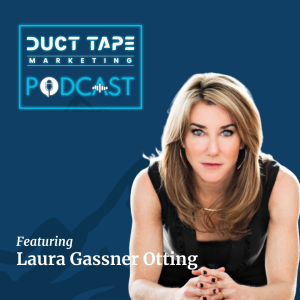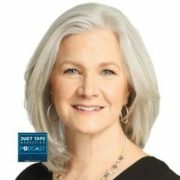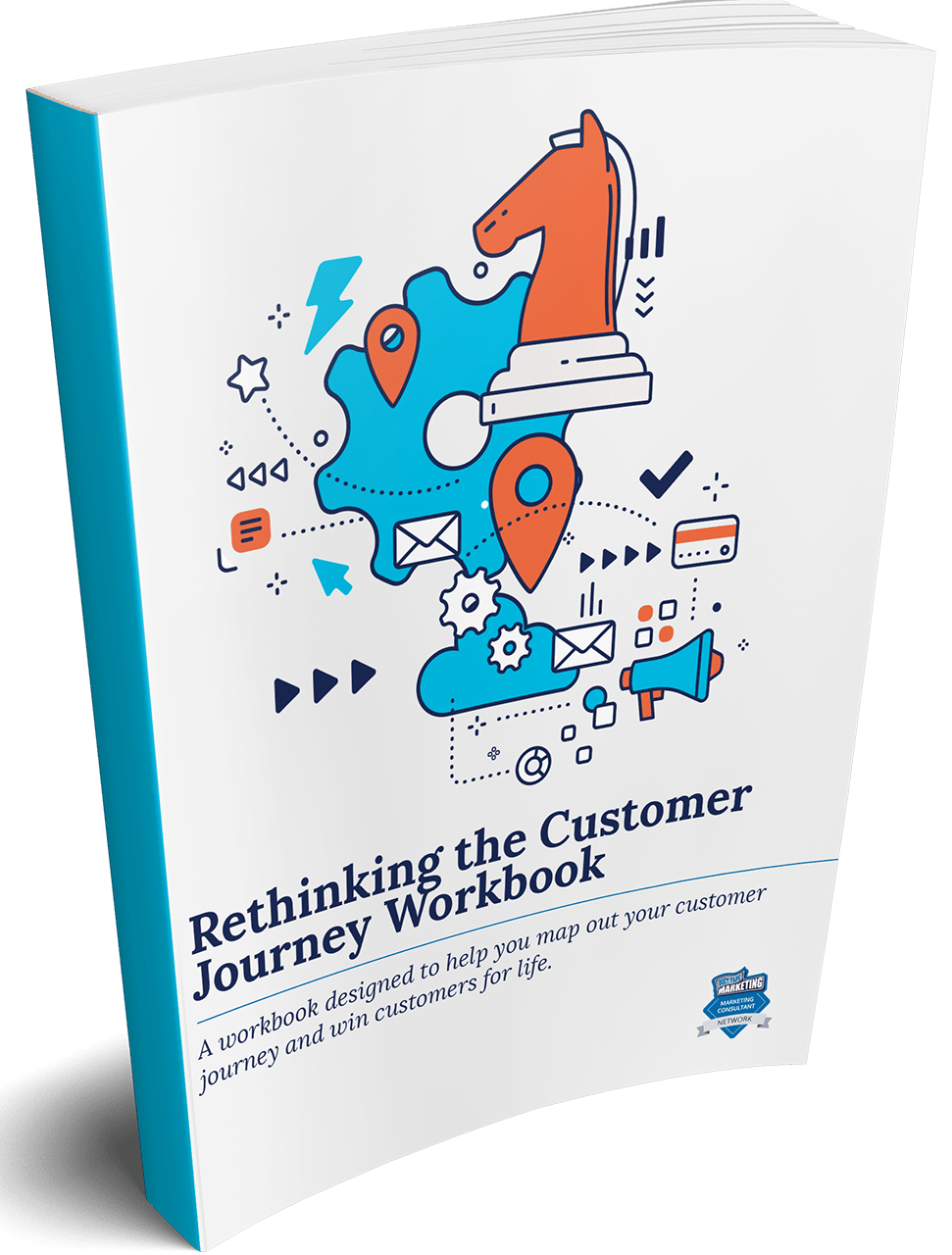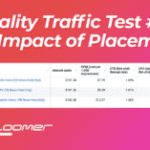Success as a Wonderful Hell
Success as a Wonderful Hell written by John Jantsch read more at Duct Tape Marketing
Marketing Podcast with Laura Gassner Otting
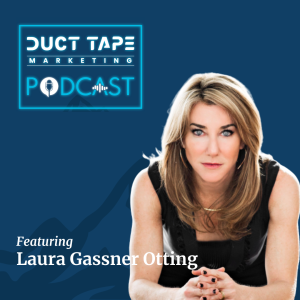 In this episode of the Duct Tape Marketing Podcast, I interview Washington Post Best Selling Author and Motivational Keynote Speaker, Laura Gassner Otting. A frequent contributor to Good Morning America, the TODAY Show, Harvard Business Review, and Oprah Daily. Laura’s 30-year experience is defined by her entrepreneurial edge. She served as a Presidential Appointee in Bill Clinton’s White House, helping shape AmeriCorps.
In this episode of the Duct Tape Marketing Podcast, I interview Washington Post Best Selling Author and Motivational Keynote Speaker, Laura Gassner Otting. A frequent contributor to Good Morning America, the TODAY Show, Harvard Business Review, and Oprah Daily. Laura’s 30-year experience is defined by her entrepreneurial edge. She served as a Presidential Appointee in Bill Clinton’s White House, helping shape AmeriCorps.
Her forthcoming book, Wonderhell, reimagines the stories we tell ourselves about success bringing you happiness, and shows how mixed emotions like fear, uncertainty, and stress accompany success.
![]()
![]()
Key Takeaway:
Success is the ultimate goal for most people, we feel a series of positive emotions and desire to reach more every time we succeed. But it is also exhausting, anxiety-provoking, self-sabotaging, etc.…it’s hell. Laura uses the analogy of an amusement park with different towns and rides that represent the various emotions and challenges that come with pursuing success. She explains the roadmap to achieving success and accepting that there is only a finite limit to your growth.
Questions I ask Laura Gassner Otting:
- [03:27] Could you describe the amusement park theme that you build the book around?
- [05:01] How did you come up with the visual thought of being in an amusement park?
- [06:55] Can you explain the stress of the impostor syndrome?
- [10:56] Can you break down the Ferris wheel ride concept?
- [13:36] Why is the concept of hustle porn bad advice?
- [19:40] How the idea of success doesn’t feel the way it should because the destination doesn’t feel right?
- [21:34] Where are you on the different paths you describe in your book?
- [23:39] The concept of the Zen Buddhist Philosophy
More About Laura Gassner Otting:
- lauragassnerotting.com
- Social Networks: @heylgo
- Pre-order Wonderhell: https://www.wonderhellbook.com
More About The Agency Certification Intensive Training:
- Learn more about the Agency Certification Intensive Training here
Take The Marketing Assessment:
- Marketingassessment.co
Like this show? Click on over and give us a review on iTunes, please!
John Jantsch (00:00): This episode of the Duct Tape Marketing Podcast is brought to you by Creative Elements hosted by Jay Klaus. It’s brought to you by the HubSpot Podcast Network. The audio destination for business professionals creative elements goes behind the scenes with today’s top creators. Through narrative interviews, Jay Klaus explores how creators like Tim Urban James Clear, Tori Dunlap and Cody Sanchez are building their audiences today. By learning how these creators make a living with their art and creativity, creative elements helps you gain the tools and confidence to do the same. In a recent episode, they talked with Kevin Perry about how he goes viral on every single platform. Listen to creative elements wherever you get your podcasts.
(00:52): Hello and welcome to another episode of the Duct Tape Marketing Podcast. This is John Jantsch, and my guest today is Laura Gassner Otting. She is the author of Limitless. You may recall she was on the show previously. She’s got a new book out coming out, I should say, Wonderhell, why Success doesn’t feel like it should and what to do about it. So Laura, welcome to the show.
Laura Gassner Otting (01:16): Hey, John, it’s so good to be back.
John Jantsch (01:19): So I know we’re gonna dig into this, but let’s just talk a little bit about pitching this idea and this title
Laura Gassner Otting (01:33): Yeah, you know, as you know, I wrote Limitless with Idea Press, which is a hybrid publisher and did not have any expectation of anything happening with that. I just wanted to write it because when I was speaking on stages, I noticed people who were making real money had books. So I was like, I gotta get me one of them. Yeah. So I wrote Limitless with a hybrid publisher, and then I was like, well, that actually was a Washington Post bestseller, and I was in the Today Show, good Morning America and all these amazing things. I’m gonna go get one of those big five New York houses, I’m gonna do it. And then I called a bunch of the big five New York houses and a bunch of the agents who sell books to the big houses, and they were like, yeah, you’re nobody. I don’t get this idea.
(02:12): The title’s a little, I don’t know, edgy, I’m not so sure. Like I could sell it, but maybe not to one of the big houses. And then I had a conversation with Amy Cuddy, who you, who I’m sure you know also mm-hmm.
John Jantsch (03:22):
Laura Gassner Otting (03:22): It really always should have been at home with Id press in the first place,
John Jantsch (03:27): So I should have you describe it because somebody’s gonna have to get into the book to understand. But I’d love to hear your thinking on the sort of the visual amusement park theme that you Yes. Kind of build the book around. So, so first you’re probably better describe it.
Laura Gassner Otting (03:41): Okay, so John, you know those moments where you’ve accomplished something, you could have sold your first business, or maybe you just sold your first contract, your first consulting crowd contract, your first two ballistic whatever. And in that moment you were like, that’s amazing, it’s exciting, it’s humbling, it’s wonderful. Yes. But also you see this vision of yourself like, maybe I could sell another one, or maybe I could build something even bigger, or maybe I could do even more. And I’m not sure. But wow, there’s a possibility out there. There’s a potential that I see in myself that I didn’t even know existed last week, last month, last year. And suddenly it’s not just wonderful, but it’s also anxiety-provoking, it’s stress-inducing, it’s identity questioning. It’s kind of hell. So it’s wonderful, but it’s also hell, it’s Wonderhell and Wonderhell, dear listeners, is where the burden of your potential walks in and goes, Hey man, what you got for me? What are you gonna do with this newfound potential? And that’s when we have to make that decision of who we are. And I mean, you know, anybody who’s ever been in business, been an entrepreneur, you know, done something for themselves, recognizes this moment when you’re like, yay. Oh hmm huh
John Jantsch (05:01): So how did you come to the visual though? That I was getting at the amusement park, the theme
Laura Gassner Otting (05:06): Park? Yes. Yes. So I was actually talking to RAAF Har Fu, who is a great friend of mine who she wrote Hustle and Float. And we were having this conversation and I’m like, you know, like we all think success is gonna be so much fun, it’s gonna be so amazing, it’s gonna be easy, it’s gonna be exciting. And then we get there and it’s actually harder than we thought. It actually kind of sucks because in that moment, if you have this bigger, this bigger hunger, this faster pace, and you wanna go, but should you, what does that mean? What is it gonna feel like? What are the sacrifices? What’s the opportunity? How do we figure it out? And she’s like, it’s kind of like an amusement park. Like you think it’s gonna be super fun and then you’re sitting in line, you know it’s three o’clock in the afternoon and it’s hot and your sunburned and that corn dog in your stomach is like threatening to go out one end or the other.
(05:50): When you get on that rollercoaster and you’re like, I thought this was gonna be fun, everyone told me it’s gonna be fun. Why isn’t it fun? She’s like, you do it and make it an amusement park because, and they have like a map like you are here and just like an amusement park, you can like pick which town you wanna go to in a different order. So in the book there’s Imposter Town, there’s Dotsville, there’s Burnout City, and in each one of the towns there are the five rides. So the 15 rides in total that represent the tsunami of emotions that are gonna come at you in all of these moments. And just like an amusement park, you can walk through the book in any order that you want in those rides, depending on where in the journey you are.
John Jantsch (06:30): So let’s visit Imposter Town. The first one, I struggle with this one because I never felt like an imposter. I see people posting these things on Facebook all the time of having imposter syndrome and I just don’t get it because I mean, all we’re really doing is learning
Laura Gassner Otting (07:02): Well, you’re one of the rare people who don’t have imposter syndrome. I mean, when I, when the reason that I wrote this book is when Limitless came out and you know more than three people, my mother, my father, and my sister bought it, I suddenly was like, oh wow, that’s pretty cool. And I had this stress that I wanted to do more, be bigger, create something that was worthy of this potential that I saw out there. And, and so I talked to a lot of people who were further ahead of me in the path, right? Like I think everybody should have a mentor who’s further ahead of them on the actual path they wanna walk on, as opposed to all these like, I’m gonna run a mastermind type people
(07:43): It’s like hashtag give me the p and l, right? Like I wanna know. And what was interesting is that I talked to Olympic medalists, startup unicorns, I talked to Glass ceiling shatters, I talked to people who ran big banks and then, you know, were running $2 billion companies and every one of them at every age and every stage had this moment where they were like, well I did that, but can I do the next thing? I don’t know. What if people find me out? What if I don’t belong? What if I’m not good enough in that moment? And so you’re one of the rare people, but I think it’s because, and I’ve known you long enough to know this, that you do see everything as this learning opportunity. And that’s a gift. You know, there is a voice inside of our head whenever we’re uncertain that goes, oh my God, you haven’t done this before.
(08:27): And the way to get rid of the imposter syndrome is to change how we think about, you know, that voice, right? How do we think about that voice and turn it into an, oh my gosh, you haven’t done this before. Which gives us the opportunity to say, we don’t need to be perfect, but instead we just need to be learning at every step of the way. Because of course you’re an imposter. I mean like what, what great news, right? Like think, just think about the term imposter syndrome. You’re an imposter. There’s something wrong with you y it’s a syndrome, you’re sick,
John Jantsch (09:16): Yeah. And I guess that’s May, it’s just maybe semantics, but I just, I have insatiable curiosity and so I want to go
Laura Gassner Otting (09:29):
John Jantsch (10:30): Yeah, yeah, you’re absolutely right about that. I mean, just even having experience and staying in the game long enough, you realize, oh, this is how this is gonna turn out. Just like endure
Laura Gassner Otting (10:40): Right? Yes. Well it’s funny, a lot of times like my, I’ve got two, you know, an 18 year old and a 20 year old, so their friends sometimes come to me for their advice and they’re like, how do you know so much? And I’m like, I’m just old
John Jantsch (10:56): So probably my favorite, if I can have a favorite ride in your book is the Ferris Wheel. Hmm. Unpack that one for me.
Laura Gassner Otting (11:04): So the Ferris wheel is also one of my favorites. In fact, I’m pitching that to Good Morning America for the, like, we’re gonna do one ride for the book launch. And here’s what I like about the Ferris wheel. Whenever we accomplish something, our view of ourselves changes, but we also find ourselves rising to new heights or to a different latitude. And in that, you know, new latitude, we, we have a different view of the world, we have a different view of the world and we have a different view of the people that are in it. And so there are a lot of people in our lives who are like, Hmm, I don’t know, do you think you should do that? And maybe you’re flying too close to the sun, and who do you think you are? And you know, we run into them in the coffee shop and they’re like, oh, I don’t know, that seems too scary. You shouldn’t do that. Well, what they really mean is, I’m too scared, I shouldn’t do that. But we had these people who have been in our lives because they’ve always been in our lives and they may not be the people who should continue in our lives going forward just like that. We had
John Jantsch (11:59): Wait, but they’re my family.
Laura Gassner Otting (12:00): Well, and it’s very funny because I talk about this a lot and I’m like, there are people who love you and they don’t want you get hurt. Right? Right. So like the last time I lived in the same house as my parents, I was 17 years old and I used to put the, I used to put the milk back in the refrigerator empty, but I would, and the car back in the garage empty, right? But the stereo turned up on full. And when I, throughout my career would tell them things like, I’m gonna drop out of law school to join this presidential campaign, or I’m gonna leave the White House to go like do executive search, or I’m gonna leave this big firm to start my own business, or I’m gonna sell that business and I don’t know, write a book. They were like, what are you doing?
(12:36): Are you sure you should do that? I’m not so sure, because the last time they knew me on a day-to-day basis, I didn’t have a frontal lobe
John Jantsch (13:36): Speaking of bad advice, one that I have railed a against for some time now. Hustle porn.
Laura Gassner Otting (13:43): Oh yes,
(14:25): But I think that there are lots of opportunities, at least you know, for me and my life, and this may be with you, with kids, with grandkids, where there may be moments where you’re like, you know, I could hustle really hard for this work right now and make more money, but I’m making enough in this moment. So maybe I’ll throttle back the work part and I’ll throttle up the parent part. Right? Or maybe you wanna like travel around the world. You know, I, I could have put this book out a year ago, but my eldest was going off to college and I thought, you know, this book’s kind of evergreen, but he’s not, and maybe this is the moment where I wanna spend a little more time just kind of just being around and not being on my office clothes with my face and a computer the whole time. And so I think we have to think about, you know, do we wanna ride the rollercoaster or do we wanna just be on the merry-go-round right now because that’s okay, we’re just gonna keep coming back around.
John Jantsch (15:16): Yeah, I think the trap, you know, of the hustle porn as you’re calling it too, is that it assumes everybody should want the same thing,
Laura Gassner Otting (15:23): Right?
John Jantsch (15:24):
Laura Gassner Otting (15:31): Or how do I define All right? I mean, as you know and limitless, I talk a lot about this where, you know, I learned in 20 years of executive search that you know, there are eight motivating factors that will pretty much convince anybody at any time as a head hunter to talk to me. And there are things like, what’s the mission of the organization and will I be inspired by the leader and how big is the impact? How many, what kinds of skills am I gonna learn? How prestigious will it look on my resume? How much money am I gonna make, right? There’s all sorts of things like that. But every one of us will, will put that list in a different order. We prioritize that list differently. And so there are moments in my life where I put money at the top and there are moments in my life where I put money somewhere in the middle, right?
(16:10): It’s going to change. So like mm-hmm
(17:05): But it might be very interesting for some of your listeners and that’s awesome, right? For some people success is the cherry red rot Maserati. For some people success is curing cancer, right? It’s some, for some people success is just having dinner with your family every night. Like every one of us is gonna define it differently. And the great thing about it is that we’re all right.
John Jantsch (17:24): Hey, marketing agency owners, you know, I can teach you the keys to doubling your business in just 90 days or your money back. Sound interesting. All you have to do is license our three step process it. It’s gonna allow you to make your competitors irrelevant, charge a premium for your services and scale perhaps without adding overhead. And here’s the best part. You could license this entire system for your agency by participating in an upcoming agency certification intensive look, why create the wheel? Use a set of tools that took us over 20 years to create. And you can have ’em today, check it out at dtm.world/certification. That’s dtm.world/certification. And now word from our sponsor, are you ready to get out of spreadsheets? Look with HubSpot crm, get realtime data at your fingertips so your teams stay in sync across the customer journey, build better content, generate more conversions, and get the content you need to create amazing experiences for your teams and your customers at scale.
(18:33): All from one powerful platform. It’s why more than 150,000 companies already use HubSpot’s CRM to run their businesses better. Plus, HubSpot’s user friendly interface sets you up for success from day one. So you can spend less time managing software and more time on what matters your customers. There’s no better time to get organized. Get started for free @hubspot.com today. So you mentioned my book, the Self-Reliant Entrepreneur. I actually wrote that book at a time when I just really wanted to do something different. And one of the entries in there, I started by saying that, you know, everyone wants to tell you how to get to the top of the mountain, but no one tells you how to get back down. And I read a very interesting statistic that more people die descending Everest than ascending. And I think that, I think this book speaks a little bit to the heart of that. You know, everybody’s like trying so hard to get to the top of this thing and then when they get there they’re like, no, I wanna be back there
Laura Gassner Otting (19:47): Well, and I think it’s also because the destination continues to change. So you know, when we say I’ll be happy when I have success, that defines success as a finite place, as an end point. But what I learned in writing this book is that in fact, success is just a way point. It’s a portal to what else we can do. So you know, when you are climbing a mountain, if you’re at the base of the mountain and you look at the top of the mountain and you’re like, I wanna go there, cool. But then you get halfway up the mountain and you look at one of those pretty vistas and maybe you’re stopping for your little picnic lunch and you look out and what do you see? You see the top of your mountain, but all the other mountains in the distance. So suddenly the view changes.
(20:25): So then you’re like, maybe I wanna go even further. How much food do I have? How much sunlight is left? How much water do I have? So suddenly you have to figure out, well what is my new definition? And so my book, I’m not trying to say like, you should always keep going and it should always be more and more that I’m saying. There may be moments where you say, actually I don’t wanna go there. I’ve now seen enough, I saw a pretty view, I’m gonna go down. Or maybe it changes. But uh, what, what I had always thought growing up that when I was successful, I’d be successful period. And everything would be easy and I’d be all done like easy money, everything’s great. But I was totally shocked to find out that at every moment, every stage where I had success, it never got easier.
(21:06): It actually got harder. And so when I sat down to talk to those hundred people, I talked about it earlier, I was like, one of them has to have an answer. One of ’em has to have a way for me to get through this. And what I learned was that on the other side of this Wonderhell is just the next one and the next one. And if we’re lucky, the next one after that. And it’s all about renegotiating our relationship with the emotions that we have towards it. So for example, it’s not I’m an imposter, but it’s wow, what an opportunity to learn.
John Jantsch (21:34): So there is a bit of a, even though it might be cyclical, there is a bit of a sort of path through this book. And so I won’t be the last one to ask you this question, where are you on the path
Laura Gassner Otting (21:45):
John Jantsch (21:46): And the reason I asked you though is because you start the book out actually with some sort of raw sharing of your experiences in those like places. And so I wonder like how is, where are you in this and how you feel like you’re progressing?
Laura Gassner Otting (22:03): You know, I’ve wrote the book as this idea that you are in Imposter Town and then maybe you’re in Burn Dotsville and then maybe you end up in Burnout City and then as soon as you figure out how to get through that, you’re right back to Imposter Town again. But I gotta say, I think I might be a little bit in all of them right now,
(22:42): I’m not sure I’m scared. I you, you know, like, I don’t know. And then, you know, you’ll get these great reviews for the most part. Sometimes you get a like, yeah, it didn’t work for me, right? But I’m, I’ve been getting these amazing emails and at the same time as I’m getting amazing emails from some of my early readers from my newsletter list, I’m also pitching, you know, good Morning America and the D Today Show and all the big shows and I’m like, oh please like me. So, you know, I feel I’m full of doubt. I’m perennially exhausted, but I’m also excited about it. And I, no matter how many times I walk out on the set of a national TV show, I’m still like, oh my God, is this the time I’m gonna barf like
John Jantsch (23:33): So as Omnis as the title sounds, I find that you come full circle towards the end and you basically, you basically explain Zen Buddhist philosophy. So yes, so there is a happy place in in coming full circle to adopting beginner’s mind, which is probably in some ways you should have saved us all kinds of time. And put that in the first chapter
Laura Gassner Otting (23:57):
John Jantsch (23:59): Because it’s the best piece of advice.
Laura Gassner Otting (24:02): Well, I don’t know, maybe I’m saving it for last. Maybe I should just written a pamphlet and not a book
(24:37): And I did. And she sent me an email last week and she’s like, okay, I have to admit I was wrong,
(25:24): And in that marathon where I’m like, oh my God, I’m working as hard as I possibly can to finish this marathon in like five hours. Like it is hard. I’m exhausted, everything hurts. I’m chasing in all the wrong places, even though I don’t know if it’s only right places to Cha
(26:05): I was at the very depth of my pain cave to get there. What I realized was, you know what the winner probably was too. And his pain cave and my pain cave probably felt exactly the same. His was just far deeper than mine.
John Jantsch (26:45): Well I think many people are gonna read this book and just as you said, they’ll find a chapter that really resonates where they are at the moment. But I also think that one of the reassuring things about this book is you’re gonna have help. A whole lot of people say, oh, that’s why I’m feeling how I’m feeling right now. Yes. And that will be reassuring I think very much
Laura Gassner Otting (27:01): For, yeah, because you know, none of us can complain like, oh boohoo things are going well. Like, who wants to hear about that? Right?
John Jantsch (27:17): Well Laura, thanks so much for taking Moment to Stop by the Duct Tape Marketing podcast. I know wonder how it’ll be available pretty much anywhere people buy books, you want to invite people anywhere else to connect with you?
Laura Gassner Otting (27:28): Yeah, so you can find me @lauragassnerotting.com and I’m on all the socials @heylgo, so people can find me there and wonderhell.com is where you can pre-order the book right now.
John Jantsch (27:39): Awesome. Again, thanks for taking the moment to stop by the show and hopefully we’ll run into you one of these days soon out there on the road.
Laura Gassner Otting (27:46): Thanks so much.
John Jantsch (27:46): Hey, and one final thing before you go. You know how I talk about marketing strategy, strategy before tactics? Well, sometimes it can be hard to understand where you stand in that, what needs to be done with regard to creating a marketing strategy. So we created a free tool for you. It’s called the Marketing Strategy Assessment. You can find it @marketingassessment.co not.com. Co check out our free marketing assessment and learn where you are with your strategy today. That’s just marketing assessment.co. I’d love to chat with you about the results that you get.
Sign up to receive email updates
Enter your name and email address below and I’ll send you periodic updates about the podcast.
This episode of the Duct Tape Marketing Podcast is brought to you by the HubSpot Podcast Network.
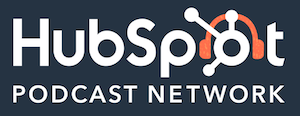
HubSpot Podcast Network is the audio destination for business professionals who seek the best education and inspiration on how to grow a business.
Did you miss our previous article…
https://www.sydneysocialmediaservices.com/?p=5528

